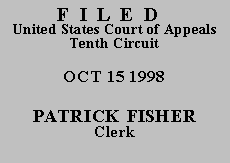

| GERALD W. MOORE, | |
| Plaintiff - Appellant, | |
| v. | |
| OFFICER RIPPY, | |
| Defendant - Appellee. |
This appeal arises out of Plaintiff's arrest by Defendant in 1992. In August 1994, Plaintiff, a pro se state prisoner, filed a 42 U.S.C. § 1983 action against Defendant claiming that he used excessive force in his arrest of Plaintiff. In June 1995, Defendant filed a motion for summary judgment in which he claimed that he was entitled to qualified immunity and that the use of force in the arrest was reasonable. Between July and October 1995, Plaintiff filed several changes of address with the court. In November 1996, the court directed Plaintiff to file a response to the summary judgment motion. Plaintiff did not file a response, and, on April 29, 1997, the court granted Defendant's summary judgment motion and dismissed Plaintiff's complaint. Plaintiff filed a notice of appeal five months later, in October 1997. We dismissed Plaintiff's appeal from the summary judgment order for lack of jurisdiction. Subsequently, the district court denied Plaintiff's Petition for Rehearing on its order granting summary judgment for "lack of diligence in prosecuting this case." R., Vol. I, Order filed Mar. 19, 1998.
On April 10, 1998, Plaintiff filed a Motion for Relief from Judgment pursuant to Federal Rule of Civil Procedure 60(b)(1) claiming that his failure to respond to the summary judgment motion was excusable neglect. In its Order filed April 24, 1998, the district court denied Plaintiff's Rule 60(b) motion. See id. at Doc. 70. Plaintiff's appeal of the court's denial of his Rule 60(b) motion is the only issue before this court. See Stubblefield v. Windsor Capital Group, 74 F.3d 990, 994 (10th Cir. 1996) (stating that "an appeal from a denial of a Rule 60(b) motion normally 'raises for review only the district court's order of denial and not the underlying judgment itself.'") (citations omitted). We review a district court's decision to grant or deny a Rule 60(b) motion for an abuse of discretion. See id. We are mindful that relief under Rule 60(b) is extraordinary and "[w]e will reverse the district court's determination 'only if we find a complete absence of a reasonable basis and are certain that the district court's decision is wrong.'" Johnston v. Cigna Corp., 14 F.3d 486, 497 (10th Cir. 1993) (quoting Pelican Prod. Corp. v. Marino, 893 F.2d 1143, 1147 (10th Cir. 1990)), cert. denied, 514 U.S. 1082 (1995).
In his brief, Plaintiff contends that he "never failed to follow up or prosecute [his] case, " Appellant's Br. at 10, and that he "never received [the summary judgment] motion that lead to the dismissal" of his section 1983 action. See id. at 13. Plaintiff's arguments, however, do not address the available grounds for relief under Rule 60(b)(1), and he presents us with no law or facts to support a determination that his failure to respond to the summary judgment motion was excusable neglect. Therefore, after thoroughly reviewing the record, we conclude that the court did not abuse its discretion in denying Plaintiff's Rule 60(b) motion.
AFFIRMED.
Entered for the Court
Monroe G. McKay
Circuit Judge
*. This order and judgment is not binding precedent, except under the doctrines of law of the case, res judicata, and collateral estoppel. The court generally disfavors the citation of orders and judgments; nevertheless, an order and judgment may be cited under the terms and conditions of 10th Cir. R. 36.3.